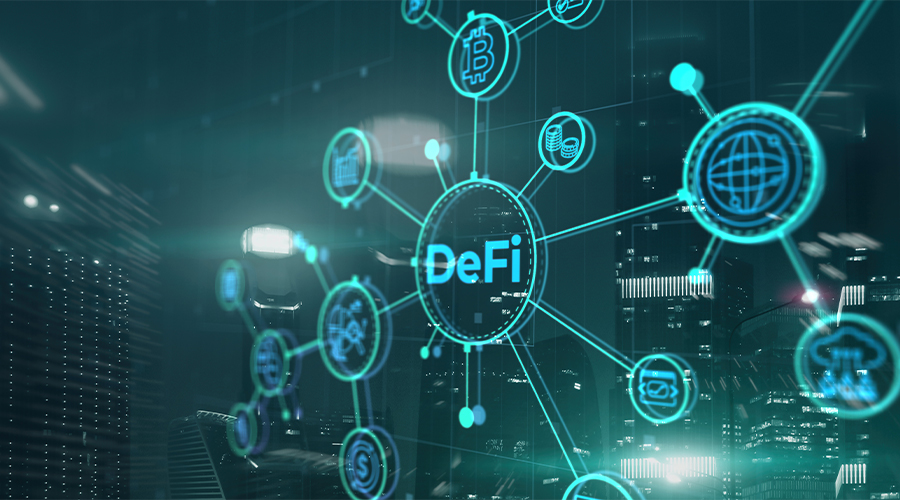
Decentralized Finance (DeFi) is an emerging financial system that leverages blockchain technology to provide transparent, accessible, and decentralized financial services to individuals around the world. Unlike traditional finance, DeFi is not controlled by centralized authorities such as banks or governments but instead operates through a network of smart contracts on a blockchain. Since its inception in 2017, DeFi has grown exponentially, attracting billions of dollars in investment and disrupting traditional financial systems. In this article, we will explore the impact of DeFi on the global economy and how it is transforming the way we think about finance.
Overview of DeFi
DeFi encompasses a broad range of financial applications, including lending and borrowing platforms, decentralized exchanges, prediction markets, and insurance protocols. These applications are built on top of blockchain networks such as Ethereum, which provide a decentralized infrastructure for executing smart contracts. Smart contracts are self-executing contracts with the terms of the agreement between buyer and seller being directly written into lines of code. They are executed automatically when certain conditions are met without the need for intermediaries.
One of the key advantages of DeFi is that it is open to anyone with an internet connection, regardless of their location or financial status. This starkly contrasts traditional finance, which often requires individuals to meet strict eligibility criteria, such as credit scores or minimum balances. In DeFi, individuals can lend or borrow funds, trade cryptocurrencies, or participate in prediction markets with just a few clicks of a button.
Impact of DeFi on the Global Economy
DeFi is still a nascent industry, but it has already significantly impacted the global economy. Here are some of the ways that DeFi is transforming the financial landscape:
- Financial Inclusion
One of the most significant impacts of DeFi is its potential to increase financial inclusion. According to the World Bank, over 1.7 billion adults around the world are unbanked, meaning they lack access to formal financial services. DeFi can help to bridge this gap by providing low-cost, accessible financial services to individuals who may not otherwise have access to them. For example, DeFi lending platforms can offer loans to individuals without requiring collateral or credit checks, making it easier for them to access credit.
- Disintermediation
DeFi is also disrupting traditional financial intermediaries, such as banks and exchanges. By leveraging blockchain technology, DeFi protocols can eliminate the need for intermediaries, reducing costs and increasing efficiency. For example, decentralized exchanges allow individuals to trade cryptocurrencies without needing a centralized exchange, which can be vulnerable to hacks or shutdowns. This disintermediation can also help to reduce the risk of systemic failures in the financial system, as the failure of one intermediary does not necessarily lead to the failure of the entire system.
- Financial Innovation
DeFi is also driving financial innovation by enabling the creation of new financial products and services. For example, prediction markets allow individuals to bet on the outcome of future events, such as elections or sports games. Insurance protocols can provide coverage for smart contract vulnerabilities or hacks. DeFi also enables the creation of new types of assets, such as synthetic assets, which track real-world assets’ value without requiring individuals to own them.
- Democratization of Finance
DeFi is democratizing finance by giving individuals greater control over their financial lives. It allows individuals to participate in financial activities without relying on centralized authorities, such as banks or governments. This gives individuals greater autonomy and the ability to make their own financial decisions. It also reduces the risk of censorship or coercion by centralized authorities, which can be particularly important in countries with repressive governments.
Challenges Faced by DeFi on Global Economy
While DeFi has the potential to revolutionize the financial landscape, it also faces a number of challenges. Here are some of the key challenges facing DeFi:
- Security Risks
DeFi protocols are built on open-source code, which means that anyone can access and analyze the code. While this transparency can help to identify vulnerabilities and improve security, it also means that hackers can easily identify weaknesses in the code and exploit them. DeFi already experienced a number of high-profile hacks, such as the $600 million hack of Poly Network in August 2021. These hacks highlight the need for better security measures in DeFi protocols.
- Regulatory Uncertainty
DeFi operates outside the purview of traditional financial regulators, which can create regulatory uncertainty. While some jurisdictions have taken steps to regulate DeFi, such as the recent proposal by the U.S. SEC to require DeFi platforms to register with the agency, many jurisdictions have yet to develop clear regulatory frameworks for DeFi. This lack of regulatory clarity can create uncertainty for investors and inhibit the growth of the industry.
- Scalability Issues
DeFi is still in its early stages, and many protocols cannot handle large volumes of transactions. As DeFi grows in popularity, scalability will become an increasingly important issue. While solutions such as layer 2 scaling and sharding are being developed, it remains to be seen how effective they will be in addressing scalability challenges.
- User Experience
DeFi protocols can be complex and difficult for the average user to navigate. This can inhibit adoption, particularly among individuals who are not technically savvy. Improving the user experience of DeFi protocols will be crucial in driving mainstream adoption of the technology.
Conclusion
DeFi has the potential to transform the financial landscape by providing accessible, decentralized financial services to individuals around the world. While the industry is still in its early stages and faces a number of challenges, the potential benefits of DeFi are significant. As DeFi continues to grow and mature, it will be important for the industry to address these challenges and develop solutions that can drive adoption and create a more equitable financial system. With the right infrastructure and regulatory frameworks in place, DeFi has the potential to revolutionize the way we think about finance and bring financial services to those who have traditionally been excluded from the financial system.
